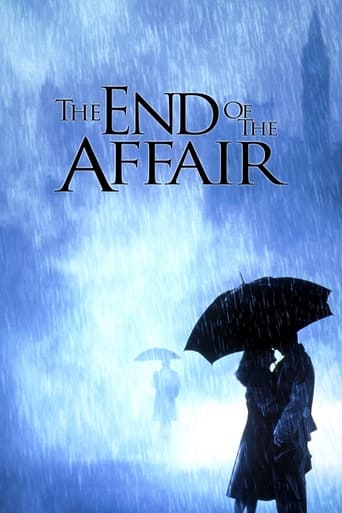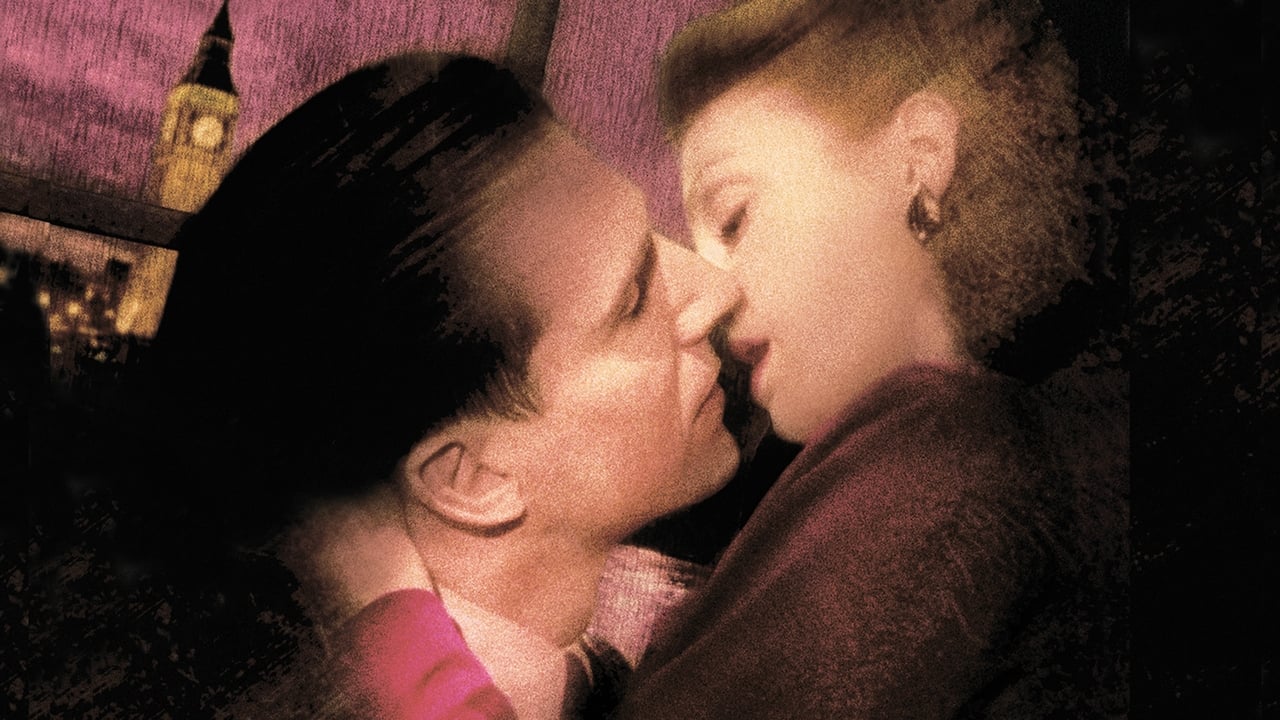Roger Burke
One could argue that there is much autobiographical information in this story, seeing as how Graham Greene and his wife were separated for many years while he maintained relationships with other women. The opening scene, for example, has novelist Maurice Bendrix (Ralph Fiennes) pounding out the opening sentence of his new story: "This is a diary of hate." That's a grabber, in anybody's language. And, being a story from Greene – one of the all-time masters of story-telling - I sat clued to my seat for the show without moving, except to fast-forward through TV commercials. I'd not seen the Van Johnson/Deborah Kerr offering from 1955, nor read the book; so it was all fresh for me.Melodrama, yes. Tear-jerker, check: obviously for some, maybe for many. Or, as Greene perhaps would've said: "An entertainment!" But, ordinary wife-cheats-on-husband bedroom romp? A resounding no! An affair takes place, yes, but this story is not just about an affair.No – this is intelligent, perceptive, and intriguing (no pun intended) story-telling, with a narrative structure that shifts between past and present in a flash, so that – perhaps for a moment or two – you're not quite sure of where you are. In that regard, The English Patient (1996) comes to mind; or even An Affair to Remember (1957).To be sure, there are raw sex scenes, but they are contextually pertinent and non-violent – Antichrist (2009) and Irreversible (2002) vie for the sexual violence cake, I think – but as adults are the only people who will fully understand the psychological, emotional and religious underpinnings of the plot for this film, those scenes cannot be regarded as objectionable, surely. After all, everybody does it, at some time.The action takes place before, during and after the Second World War but not in that order; scenes shift, as I said, between time periods. Hence, you must concentrate and be aware of visual cues to reduce confusion, maybe. I, for one, thoroughly enjoyed the narrative structure.Rather than go through the plot – the short synopsis on the IMDb main page is sufficient – it's better to simply ask this: how can you possibly resist a story where the lover, not the husband, hires the PI to follow the wife?Julianne Moore as Sarah Miles is a great actress; Ralph Fiennes is equal or better; and Stephen Rhea as Henry Miles is voice and picture perfect as an icon of the British Establishment. All three give outstanding and believable performances, and ably assisted by an effective supporting cast, with special mention for Ian Hart as Mr Parkis, the private detective.The only criticism of note, perhaps, concerns the ending and resolution of this extended ménage-a-trois: from one perspective, it's fitting for the times in which the story is set. For a modern audience, though, it's probably clichéd and overly agonistic. Being Greene's wish-fulfillment-in-fiction, however, it is probably quite appropriate. I liked it, even the metaphorical, but silly, slap-in-the-face for poor Maurice and his arrogance. But, you must see the movie to understand that comment and the whole story.Put it this way: if you are having an affair, or even contemplating doing so now or in the future, do yourself a favor: see this movie.Highly recommended.November 21, 2011.
evanston_dad
"The End of the Affair" offered up one of the most interesting conceits to appear in any of Graham Greene's novels: a love triangle not between a woman and two men, but between a man, a woman and her faith.I'm not usually a stickler for exact faithfulness in book to movie adaptations, as I've never understood the point of making a movie if you're just going to try as closely as possible to replicate the book. However, I will admit that there were far too many liberties taken with Greene's story -- which was perfect as originally written -- for me to fully enjoy the film. What I did enjoy, however, was Julianne Moore's performance, which takes a tricky character and nails it perfectly. And I give writer/director Neil Jordan credit too. He may have made some errors in writing his adaptation, but his direction captures the tone of Greene's book flawlessly, and that's usually more important than capturing all of the plot details.Grade: B+
jpschapira
There are faces that cameras like. Ralph Fiennes, for example, in any movie you watch him, whether he is a psycho killer ("Red Dragon") or Voldemort himself ("Harry Potter"), he looks good. If the camera loves you, you don't need to worry because at the end of the day everything will be okay, and I say this because I've never thought of him as a great actor. Again, the camera loves his face but that face says nothing to me. Even more interesting, I've never seen him hit the right chemistry with a female co-star; not with Jennifer Lopez in "Maid in Manhattan", not with Rachel Weisz in "The Constant Gardener". Here, in Neil Jordan's "The end of the affair", the chemistry is not the best with Julianne Moore, but we feel the overwhelming love the movie is trying to express. Has it got to do with other things? Julianne Moore, undoubtedly one of America's best contemporary actresses and one that can do just about anything, plays Sarah Miles, the wife of Henry Miles (Stephen Rea) who falls in love with Maurice Bendrix, the character played by Fiennes.This is the basic establishment of the film, which will revolve around these three characters in what we could define as an 'exploration'. Jordan, who adapted Graham Greene's homonymous novel in a very ambitious script, is great at playing with expectations. The viewer never quite knows when things are occurring and if they are truly occurring: characters wear the same clothes most of the time, scenes and conversations are repeated from different perspectives and flashbacks come out of nowhere. From the very first scene, Roger Pratt's cinematography suggests quite a dreamlike mood; and Michael Nyman's intense score accentuates it. So Jordan develops the characters, makes them talk, shoots them making passionate love in sex scenes that say a lot, works heavily on the looks and everything turns slow, very slow so we can understand this 'affair'; but nothing is ever boring. To contribute to the definition of 'exploration', the film introduces a private investigator as a major secondary character (played by Ian Hart) as both Sarah's husband and her lover in different occasions attempt to investigate her. Turns out Sarah is a woman with a very profound inner world, that translates differently on the outside.This ambivalence is the key of Moore's brilliant performance, and in a film with very few of those we would call moments, she composes a human being we want to understand and we finally do because Moore and the movie gladly help us. There is one scene, maybe the film's only 'moment', in which a siren sounds and Sarah has to leave Maurice. Pay attention at Moore in that precise moment, at everything she does and says before concluding in one simple word: "Yes". What she does can't be described because it must be experienced; and that whole scene in which Fiennes shines like man filled with love, is a scene I'd like to be able to watch frequently as it occurs to me with scenes in movies that represent pure, perfect acting (I recall one scene with Winona Ryder and Cher in "Mermaids"
do you remember?).The portrayal of Stephen Rea as Sarah's husband Henry is also crucial, because his character needs to appear as completely naive and insubstantial, and it's not easy to sustain that image for two hours. Rea really seems like an anonymous guy in the world. Fiennes' work on the other hand expresses the monumental love I was just talking about. His character is a writer, and as Sarah's lover, he finds a new meaning for love every day, and astonishes her with how he puts it in words. Henry and Maurice are two jealous men, of the same woman; and it will be the writer who will at one point tell Henry: "Lovers are jealous, husbands are ridiculous", resuming in this way their fundamental difference. I still haven't talked about God; about another part of the definition of 'exploration' that is related with exploring the faith. It is not a minor subject of the movie and it's implicated in some of the things I've said in this review, but I'll leave it for you to discover that plot line and relate it with the things I admired about this very ambitious piece. A piece you could see as a story about an affair, as a tale about love, as a character piece, or more concretely expressed and interesting: the story of two men united by the love they felt for the same woman. Would you go see a film promoted like that? Everything is possible.
anduarto
A surprisingly weak adaptation of fairly strong novel Graham Green. Much of the strength of Green's novel lay in its unsentimental, almost stark prose. This movie, on the other hand, is all violins and histrionic embellishment. (The lovemaking scenes border on the comic by the third or fourth round). I guess the clipped, wooden dialog is supposed to reflect Green's austere style. Unfortunately the film misses the mark on both points.The cast is good with the usual cinematic liberties - Henry (Stephen Rea) is supposed to be somewhat corpulent. Julianne Moore seems like an odd choice for the captivating Sarah, but she does her best. Ralph Fiennes is a good choice for Bendix and Ian Hart almost singe- handedly saves the movie. Almost. Unfortunately, a major character who provides significant influence on the plot is completely absent from the film. As a result, Sarah's path and the eventual outcome stray a fair bit from the novel's intent. I like character driven movies as much or more than the next guy, but this one doesn't seem to have much gas. Please don't judge the novel based on this filmNote: I always check the spoiler box because I'm never sure when discussion of plot is considered "spoiling". Seems to me it's difficult to have a worthwhile discussion of a film without touching on plot at least a little.



 AD
AD












